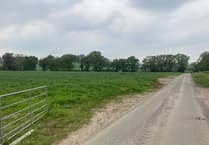A poll of polls has the Greens favourites to win the West of England metro mayoral election this Thursday (May 1).
But the latest survey of voting intentions, published on Sunday, April 27, actually puts Labour in first place.
Independent statistician Nigel Marriott, from Bath, has updated his forecast from earlier this month, which had the Greens narrowly in the lead, and adjusted how he has crunched the numbers in the wake of two polls since then, along with a prediction by politically neutral analysts.
He said the race remained a five-way marginal “the likes of which have never been seen in England before” and that there was cause for optimism for all the main parties.
Mr Marriott has now factored in polls over the last few days by YouGov and MoreInCommon, which asked who people would vote for to be the elected head of the West of England Combined Authority (Weca) – in charge of the region’s transport, strategic planning, adult skills and economy – and a forecast by Elections Predictor & Political Commentary.
On his blog, he said: “The metro mayor election will probably be won with less than a quarter of all votes cast.
“All five parties have reasons to be optimistic but as of now, I and most other forecasters make the Greens favourites to win.
“With an election this tight, the parties’ get-out-the-vote efforts will play a big part in the final outcome.
“Weca residents should expect to be bombarded by the candidates this week.”

Mr Marriott said he had not changed his mind from two weeks ago that the Greens were mostly likely to win, although the predicted vote shares of each party had changed slightly because of the latest polling data.
He is predicting that for the three local councils that make up the combined authority, the Lib Dems will come first in Bath & North East Somerset, Greens in Bristol and Reform in South Gloucestershire.
The statistician said: “This is a true five-way marginal which is incredibly difficult to forecast.
“The one thing I and my fellow forecasters appear to agree on is what Labour’s vote share will be – 22 or 23 per cent.
“Labour are the governing party nationally and the incumbent Weca mayoralty holder and they are historically unpopular today.
“The difficulty is estimating how those opposing or unhappy with Labour will vote.”
He said his forecast and the other three all had the Greens ahead of the Lib Dems but that the gap varied from 14 points by YouGov to one point by Elections Predictor.
Mr Marriott said the difference between the two parties would depend heavily on turnout in specific council areas, so if Bristol had a low number of people voting, the Lib Dems would do better than expected because more than 70 per cent of the Green vote in Weca came from the city.
“In the end, three of us have the Greens winning the mayoralty with MoreInCommon predicting a Labour victory,” he said.
Mr Marriott has calculated the average of the four forecasts which indicates victory for the Greens on 24 per cent, Labour on 22 per cent, Lib Dems 18 per cent, Reform 17 per cent, Conservatives 16 per cent, and the independent on four per cent.
YouGov’s poll on Friday, April 25, had the Greens in the lead on 27 per cent, Labour second with 23 per cent, Reform on 18 per cent, Conservatives 17 per cent, Lib Dems 13 per cent and the independent with two per cent.
Labour, however, has seized on the MoreInCommon poll, published two days later, which gave the party a win with 23 per cent of the vote, ahead of the Conservatives with 21 per cent, Reform and Greens both on 18 per cent, Lib Dems 15 per cent and the independent with five per cent.
Labour claimed it showed that the party’s candidate was now the “clear frontrunner”, despite the closeness of the race and the other polls placing the Greens ahead.
A campaign spokesperson said: “Voters across Bristol, Bath & North East Somerset, and South Gloucestershire know this is a pivotal moment.
“With Helen Godwin as mayor working alongside a Labour government, we’ll finally see the investment in rail, bus services, affordable homes and economic growth that our region deserves”.
However, MoreInCommon said it was too close to call and that Labour held a “paper-thin lead”, while four parties were within the margin of error and even the fifth, the Lib Dems, could not be ruled out.
It said: “Despite being an area of Labour strength in last July’s General Election, there was a palpable sense of disappointment with the government’s first few months.
“In the West of England, the Labour Party has a net approval rating of minus 18, while Keir Starmer’s personal approval rating is minus19.
“In focus groups, some voters who had abandoned Labour to the left cited benefit cuts, alongside a wider sense that the government hasn’t delivered the scale of change they were expecting.
“While there was some willingness to give Labour more time before making a judgement, some felt that Labour’s performance in government was symptomatic of a wider problem with politics and politicians.
“Given this deep anti-politics sentiment, it is perhaps unsurprising that voters in the West of England are split across five parties, and that the qualities they most want from the new mayor are honesty and trustworthiness.”
Mr Marriott’s forecast is here: https://marriott-stats.com/nigels-blog/weca-mayor-2025-election-forecast-2/
The six candidates in the election are:
- Arron Banks (Reform UK)
- Helen Godwin (Labour)
- Oli Henman (Liberal Democrat)
- Mary Page (Green)
- Ian Scott (Independent)
- Steve Smith (Conservative)
.jpeg?width=752&height=500&crop=752:500)

.jpeg?width=209&height=140&crop=209:145,smart&quality=75)




Comments
This article has no comments yet. Be the first to leave a comment.